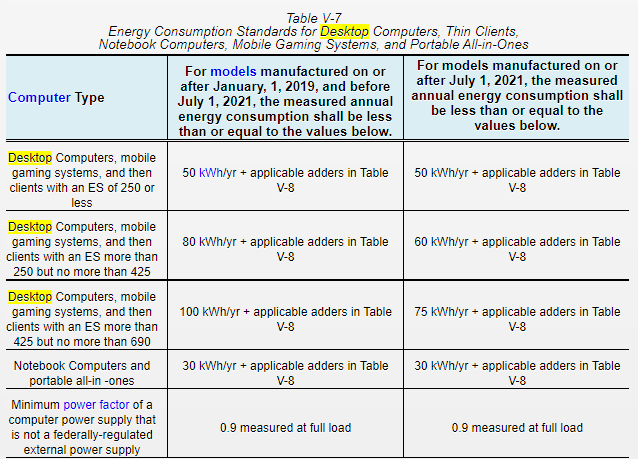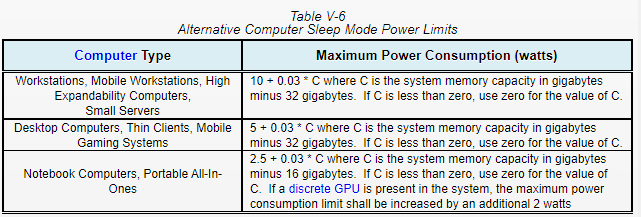
You may have seen the clickbait floating around claiming that California is "banning gaming PCs." Many of these articles point to Dell refusing to sell particular Alienware systems to California and other states due to new regulations. However, the reports of the death of gaming PCs in Cali are greatly exaggerated.
Before we all panic and start hoarding gaming PCs like we are crypto miners, there are a few important things to understand about the new Title 20 energy efficiency regulations:
- The regulations only apply to prebuilds from systems integrators (SIs), not custom builds
- The new law regulates both the sleeping power consumption and offers a reasonably generous annual power consumption limitation that scales with the size of the PC
- The efficiency calculations take into account expandability, so they can end up favoring larger PCs over smaller builds
“They are not targeting gamers specifically, they are targeting gluttons,” JayzTwoCents explained in his very helpful video on this topic, where he explained the regulations.
So rest assured, California is not banning gaming PCs. That said, they are instituting some new energy efficiency specifications that may block the sale of certain prebuilt PCs that don’t comply with the new energy efficiency requirements.
The regulations in question were put into planned effect in 2016. The standards are being phased in over the course of five years, with each year a new class of devices being added to the list. The newest wave of effective regulations activated on July 1st, affecting desktop computers, thin clients, and mobile gaming systems. California is also joined by Washington, Oregon, Hawaii, and Vermont in instituting the new energy standards.
As stated above, these regulations will only affect residents of California and the other states if they are buying from a Systems Integrator like Alienware, Origin, IBuyPower, etc., who have contracts with hardware manufacturers and make gaming systems for people. If you are building your own custom PC, these regulations will not affect you.
Which PCs will be illegal to sell in California?
According to the California government, in order for a prebuilt desktop computer to be legal to sell in California it must consume less than the following kilowatt‐hours per year:

You will notice that different levels of PC have different allowed power budgets. This is based on a complicated expandability score that takes into account a PC's ability to add things like more graphics cards or more RAM.
"The 'expandability score' is designed to give bigger PCs that draw more power a bigger budget,
so if anything a big gaming tower would be easier to purchase under new regs than a small one,
which is backwards for sure," explained Tyler Humphries, a Security Analyst and PC gaming buff.
"[The regulators] are trying to take into account the expandability and total power draw of a computer when it's fully kitted out, which is a good thing, they just went about it in a very weird way because they probably didn't even know small form factor PCs exist."
Additionally, computers must also meet the following maximum power consumption standards while in sleep mode:

There are some exceptions to the efficiency rules as well, mostly focused on business applications. Small servers that are always on and “high expandability computers” can both be certified under the new regulations. Additionally, medical computers and devices are entirely exempt from these regulations.
A high expandability PC is defined by having a 600 watts or greater power supply, and either a discrete GPU with a frame buffer bandwidth of 600 gigabytes per second or greater or a total of 8 gigabytes of RAM with a bandwidth of 632 GB/s and an integrated GPU. So some of the most powerful PC gaming rigs might qualify for that exemption straight up.
The ultimate impact of these regulations should be more power-efficient prebuilds, where SIs can at least some of their builds to be legal for sale in the affected states. So even if there are some growing pains in the short term, with older models not meeting efficiency specs, in the long run, these regulations are probably a good thing.
And for the DIYer’s out there, you will be unaffected by the new regulations. Build your super-powered gaming PCs to your heart's content.
This article has been updated to correct an error that reported the regulations only applied to sleeping PCs. V-6 refers to sleeping PCs, whereas the V-7 table refers to the overall measured annual consumption of a PC. We have updated the copy of this article to reflect that information.

Sort by:
Comments :0